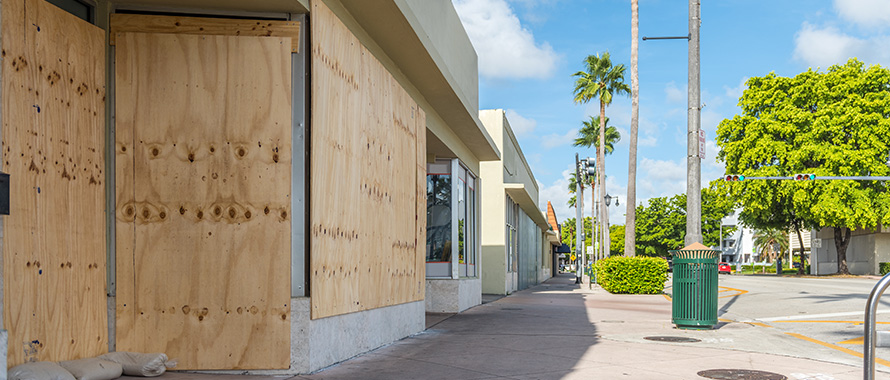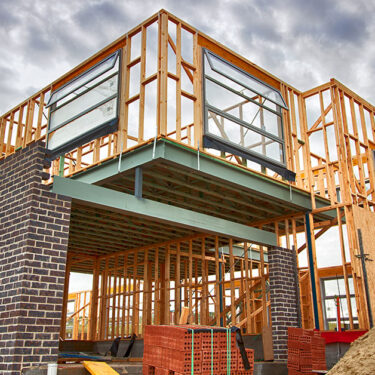Businesses around the world are experiencing the effects of the largest economic downturn since the 1940s. Some economists show the U.S. as having exited or nearly recovered from the recession that began in February, and Canada is showing signs of recovering from its deepest recession on record. Nevertheless, businesses continue to face numerous risks while shut down or operating at reduced capacity.
That reality was reinforced during the past two weeks as protests over the death of George Floyd in police custody on May 25 initially gave way to vandalism and looting in some areas. In Minneapolis, where Floyd’s death occurred, property damage at 220 or more buildings totaled at least $55 million.
Police in Scottsdale, Arizona reported millions of dollars in damages and theft from a looted shopping area and New York City businesses face tens of millions in property damage and lost inventory. In Quebec, Montreal police have opened 70 investigations of acts of vandalism.
Business owners in California have said the vandalism and looting added another obstacle to already complex efforts to reopen amid the COVID-19 crisis.
While facing a range of threats from civil unrest to shareholder lawsuits, companies must continue to adapt to extended shutdowns and governmental restrictions aimed at slowing the spread of COVID-19. Lapses in insurance coverage could spell disaster during these already trying times.
“Businesses have been facing financial setbacks for months,” said Drew Dean, Managing Director, Burns & Wilcox, Indianapolis, Indiana. “One day they may see reopening as their biggest hurdle and the next they may find themselves boarding up broken windows or cleaning up after looting.”
Without insurance in place, businesses face the prospect of potentially catastrophic losses. Beyond the temporary rise in looting and vandalism, everyday risks including fires and flooding also loom large, underscoring the danger of lapsed insurance coverage.
“Companies are looking for anywhere to save right now—especially smaller, local businesses,” said Patricia Sheridan, Manager, Ontario Property & Casualty, Burns & Wilcox, Toronto, Ontario. “During times of economic difficulty, it is more important than ever to make sure that you have the correct insurance in place to help your business recover from any type of loss.”
Recession, COVID-19 guidelines could mean an uptick in lawsuits
“The number of lawsuits filed increases when the economy experiences any type of recession,” said Heather Schaaf, Underwriting Director, Executive Liability, Burns & Wilcox, Chicago, Illinois. “Even a company that holds itself to the highest standards of ethics and sound business practices could become the target of a lawsuit alleging wrongdoing or poor decision-making. Insurance will help mitigate the costs of defending against those allegations.”
Having the appropriate Employment Practices Liability Insurance (EPLI) and Directors and Officers (D&O) Insurance coverage in place is essential for businesses, especially in times of economic downturn. EPLI covers perils including discrimination or wrongful termination lawsuits, while D&O Insurance covers a company’s directors and officers in the event they are named in a lawsuit.
“Lawsuits are enormously expensive, even if a company or its officers are found to be not at fault,” Schaaf pointed out. Google is currently facing a $5 billion lawsuit for tracking internet information on millions of users who utilize the browser’s “incognito mode” function to block such tracking. Such lawsuits can trigger a regulatory investigation that could lead to further lawsuits, potentially involving company officers, Schaaf said.
“Directors and officers are often named in lawsuits alleging inadequate disclosure or deceptive trade practices,” she explained. “A D&O Insurance policy would help to cover the costs of investigating allegations and defending such lawsuits.”
On June 4, a shareholder filed a lawsuit against L Brands, the parent company of Victoria’s Secret, alleging a “toxic culture of sexual harassment, discrimination, and retaliation” at the lingerie company.
The costs of defending a case such as this could also be mitigated with the appropriate D&O Insurance coverage, Schaaf said. “Directors and officers are named in these lawsuits when there are large-scale allegations that they should have been aware of their company’s negative culture and done more to address or prevent it, or claims that they attempted to hide the situation from their shareholders,” she said.
Even companies that are fully or partially shut down can face lawsuits. As businesses reopen and implement new restrictions and requirements related to COVID-19, that risk could increase. Hiring and rehiring practices, as well as accommodations for employees who do not feel safe returning to work should be carefully considered, Schaaf said.
“Employers should take care to ensure they are providing a healthy and safe workplace and that they are following all current guidelines,” Schaaf emphasized. “Ideally a full-time human resources professional familiar with evolving employment regulations is sharing that information with everyone in the company so regulations and guidelines can be followed to the letter.”
Recent fires, storms show ongoing risks to commercial property
Burglaries, storm damage, fires and events continue to pose risks while a business is shut down or operating at reduced capacity. In some cases risks increase when a building is vacant.

The potential for losses in a fire can be greater when employees are not present or the building is not under regular surveillance.
Non-residential building fires in the U.S. caused more than $2.6 billion in losses in 2018, while losses from hurricanes and storm-related flooding are estimated at $9 billion in the U.S. annually. In Vancouver, Canada, burglaries recently spiked 147 percent at businesses closed due to COVID-19.
On June 5, a 600,000-square-foot warehouse in Redlands, California was destroyed in a fire that also damaged several rigs owned by Amazon that were parked nearby. A week earlier, a 189-unit affordable housing complex under construction in Minneapolis was destroyed in a fire — one of many commercial properties that burned during the widespread vandalism and looting that took place in that city on May 27 and May 28.
“The potential for losses in a fire can be greater when employees are not present or the building is not under regular surveillance,” Dean explained.
Wind and storm damage can also take longer to detect when businesses are closed. On June 3, a cluster of severe storms across Eastern Pennsylvania, New Jersey and New York resulted in the tragic loss of three lives, left 575,000 homes without power and caused significant structural damage. “If a roof leaks while a business is open, it is likely to be noticed promptly,” Dean said. “Some damage can become more severe simply because a building is unoccupied.”
If Commercial Property Insurance coverage lapses, business owners may not have the resources to recover from property damage, Sheridan noted. Without proper coverage in place, she said, a company’s profits or savings could be depleted by the cost of repairing damage from a single incident, rather than being safeguarded by a Commercial Property Insurance policy that can help mitigate the costs.
Beyond property damage, lawsuits stemming from injuries to customers or employees on a business’ premises can come with substantial expenses, Sheridan added. About $50 billion is spent on non-fatal fall injuries each year in the U.S., and $16 billion for unintentional injuries in Canada. “Businesses should not skimp on Commercial General Liability (CGL) Insurance coverage,” Dean said. “In a litigious society, you have to be prepared for an injury to customers or patrons.”
Insurance lapses can have long-term consequences
Some carriers have given companies facing temporary financial hardship a grace period for lapsing in premium payments for their Commercial Property Insurance during the COVID-19 crisis, said Dean. However, he cautioned, problems can arise if a business experiences a loss from an event such as vandalism or looting while its insurance policies are considered to have lapsed. “For example, premium rates could be impacted by re-underwriting that would need to take place from a property perspective,” he said.
Under any circumstances, keeping in touch with your insurance broker or agent is critical. Inquiries about coverages have increased over the past few months—a positive sign, according to Sheridan. “Business leaders are doing their due diligence to make sure that they have the appropriate insurance coverage in place,” she said.
Schaaf explained that a 60-day window for claims reporting typically applies after an EPLI or D&O Insurance policy expires to cover claims that occurred while the policy was in place. However, a company must obtain replacement cover for the next policy period. “It will be difficult to place new cover if a company allowed their policy to lapse, as many carriers in the EPLI and D&O Insurance marketplace right now are not offering terms at all if the company does not have current coverage in place,” Schaaf noted.
Additionally, she said, insurance carriers willing to insure a business that has allowed its EPLI and D&O Insurance coverage to lapse will impose a Past Acts Exclusion on their policy quotes, which means that losses related to any events that took place prior to the policy’s effective date will not be covered.
Business owners shopping for EPLI and D&O Insurance may also find that the underwriting process is more extensive than it was previously, Schaaf said. “Underwriters are scrutinizing each account’s financials much more closely and in greater depth,” she explained. “Given the changes that has taken place so far this year, underwriters are taking extra measures to ensure clients can weather any losses they experience until the economy gains traction and revenues improve.”








